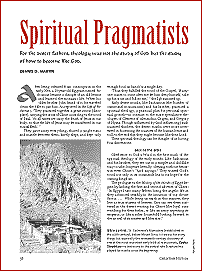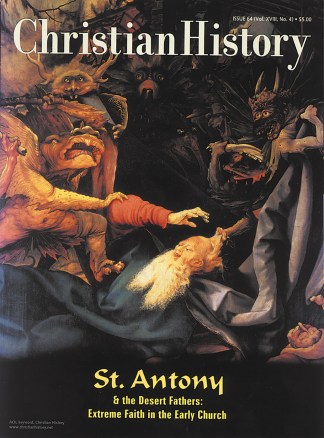
After being released from conscription in the early 300s, a 20-year-old Egyptian named Pachomius became a disciple of an old hermit and learned the monastic life. When his older brother John heard of it, he traveled down the Nile to join him. As reported in the Life of Pachomius, "They practiced together a great ascesis [discipline], carrying the cross of Christ according to the word of Paul, 'At all times we carry the death of Jesus in our body, so that the life of Jesus may be manifested in our mortal flesh.'"
They gave away everything, shared a single tunic and mantle between them, barely slept, and kept only enough food on hand for a single day.
"Thus they fulfilled the word of the Gospel, 'If anyone wants to come after me let him deny himself, take up his cross and follow me,'" the Life summed up.
Early desert monks, like Pachomius (the founder of communal monasticism) and his brother, practiced a spiritual theology, a practical plan for personal spiritual growth—in contrast to the more speculative theologies of Clement of Alexandria, Origen, and Gregory of Nyssa. Though influenced by (and influencing) such nuanced thinkers, the desert monks were more interested in discerning the nuances of the human heart and will, to the end that they might become like their Lord.
Their spiritual theology can be thought of as having four dimensions.
Back to the Bible
Obedience to God's Word is the first mark of the spiritual theology of the early monks. Like Pachomius and his brother, they set out in a simple and childlike way to take Scripture literally, obeying without hesitation even Christ's "hard sayings." They trusted God's word not only in its commands but in its hope for the coming kingdom.
The prologue to the History of the Monks of Egypt begins by linking the first and second advents of Christ: "In Egypt I saw many fathers living the angelic life as they advanced steadily in the imitation of our divine Savior. … While living on earth in this manner, they live as true citizens of heaven. One can see them scattered in the desert waiting for Christ like loyal sons watching for their father, or like an army expecting its emperor, or like a sober household looking forward to the arrival of its master and liberator."
Meditation on Scripture was the method by which these monks took Scripture seriously. They tried to literally "pray without ceasing" by chanting the Psalter, and other Scripture passages, as they wove baskets throughout the day. Many memorized large portions of the Bible in this way: Abba Ammonius is said to have memorized the entire Old and New Testaments plus thousands of lines from Origen, Didymus the Blind, and other early writers.
The need for discernment
The second theme in desert theology is discretio, that is, discernment or guidance from a wise senior monk. When a young monk sought entry to a hermit community, he approached a senior monk and said, "Abba, give me a word," thereby entrusting himself to the guidance of this spiritual father. John Climacus (d. c.649), a monk of St. Catherine's in the Sinai, advised monks to choose their spiritual father carefully, but, having chosen, not to second-guess him.
Spiritual fathers, for their part, were careful in their guidance. One ancient account says that Abba Pambo, when asked about a scriptural phrase or some other problem, "would never answer on the spur of the moment but used to say: 'I have not found it.' Often a period of three months would go by and he had not given an answer, saying that he had not comprehended it. So they accepted his answers as though they were from God himself, approved and shaped by his will."
Discernment extended to all matters, from interpretation of Scripture to the seemingly small aspects of daily life—which sometimes became parables for larger spiritual truths (some of which are lost on modern readers).
For example, a story is told of Abba Agatho, who was on a journey with his disciples when they came across a little bundle of green peas on the road. One of his disciples said to Agatho, "Father, if you will, I shall lift that."
The old man looked at him quizzically and said, "Did you put it there?"
The disciple replied, "No."
To which Abba Agatho said, "How could you wish to lift up that which you did not put down?"
Discernment was not a luxury but a matter of spiritual life and death. In the words of sixth-century Dorotheus of Gaza, "I know of no fall that happens to a monk that does not come from trusting his own judgment. … Do you know someone who has fallen? Be sure that he directed himself. Nothing is more grievous than to be one's own director, nothing is more pernicious."
The role of discipline
What one might have expected to be the main theme in the desert fathers' theology was actually third in importance to them: asceticism. For the monks "the discipline" proceeded from a commitment to the Bible and the need for discernment.
Plotinus and other pagan sages treated the body as if it were a transient and accidental adjunct to the self. Not the monks. For them, the body was grippingly present. One spoke of it as "this body, that God has afforded me, as a field to cultivate, where I might work and become rich."
John Climacus, using running as a metaphor for bodily self-discipline, put it more strongly: "We must run, brothers, we must run. We have to run very hard because we have fallen behind our holy company. So let us run, driving on this foul and wicked flesh of ours, killing it as it has killed us."
Though Climacus sounds harsh, the early monks did not believe that matter or the body was evil—after all, it was created by God, and nothing God made could be evil in and of itself. The "flesh" the desert fathers sought to subdue was not merely their physical bodies but their sinful "flesh," in the New Testament sense of the word.
Historian of the ancient world Peter Brown said, "Seldom, in ancient thought, had the body been seen as more deeply implicated in the transformation of the soul, and never was it made to bear so heavy a burden."
Desert monks believed that the passions of body and heart were unruly and disordered as a result of sin, and that the body needed to be disciplined to make it obedient so that the soul could rejoice in Christ.
In spite of the stereotype, this required a certain amount of moderation, as most monks were well aware. A hunter once came across Antony "talking gladly" with other monks, and he questioned the great ascetic about his seeming lack of rigor (one monastic discipline was to live in silence).
Antony replied, "Put an arrow in your bow, and draw it." When the hunter did so, Antony told him to draw it further.
Again he obeyed but then said, "If I draw it too far, the bow will snap."
Antony answered, "So it is with God's work. If we go to excess, the brothers quickly become exhausted. It is sometimes best not to be rigid."
What constituted "moderation"? We need to recall that these monks lived in a world in which, by modern Western standards, the average peasant's life was involuntarily ascetic. The poor, rural or urban, lived on the simplest of diets and in houses we today would call shacks. The "extreme" nature of the desert monks' asceticism must be seen in this context.
It is true that, on occasion, discretion failed spiritual fathers, but criticism of extreme asceticism was never lacking. The History of the Monks of Egypt says that Abba Apollo "severely censured" those who wore iron chains and let their hair grow long: "For these make an exhibition of themselves and chase after human approbation," he said, "when instead they should make the body waste away in fasting and do good in secret. Rather than do this, they make themselves conspicuous to all."
In the end, asceticism was designed to help monks achieve apatheia, which has nothing to do with "apathy" and everything to do with reordering the disordered "stirrings" of the soul caused by sin. The Latin equivalent would be puritas cordis, a clearly focused, pure, "single" heart.
"Whatever can guide us towards purity of heart is to be followed with all our power," said Abba Moses. "Whatever draws us away from it is to be avoided as hurtful and worse. It is for this end—to keep our hearts continually pure—that we do and endure everything. … If we do not keep this mark continually before the eyes, all our travail will be futile waste that wins nothing."
Back to the world
Despite the appearance of abandoning the world, the monks' flight into the desert ultimately allowed them to reintegrate with society, serving it in unexpected ways.
Their renunciation of sex, marriage, and property lifted them out of kinship and property networks. This, combined with their reputation for sanctity, made them favorite arbitrators for quarreling villagers. Abba Apollo more than once resolved conflicts over land boundaries between pagan and Christian visitors by performing miracles. In another instance, he converted a group of pagan priests by a miracle, catechized them, and turned them over to the local parishes.
Another example is John of Lycopolis, profiled in the History of the Monks of Egypt, who counseled Emperor Theodosius, as well as generals, tribunes, and wives of military officers.
The early monks were also integrated into the life of the church. Some writers have portrayed the early monastic movement as an anti-ecclesiastical layman's protest against an increasingly institutional church. Not so. Saturday and Sunday eucharistic worship in the nearest parish church, for example, was a regular feature of the earliest hermit and cenobitic communities.
Integration into the church extended all the way to the top: Pachomius advised Athanasius, the great bishop of Alexandria. And the traffic also went the other way: Archbishop Elias repeatedly sent Sabas (see "Holy Land," page 32) to Constantinople to plead with Anastasius on behalf of the church. Theodoret of Cyrrhus tells of a hermit named Abraham who was drafted to become bishop. And many of the early bishops of Gaul, including Martin of Tours, were chosen from monastic-hermit ranks.
Preparing for the end
These early monks perceived more clearly than most the disorder sin causes in the soul and in society— as well as its ultimate consequences. They were driven ultimately by a vivid realization of Christ's coming judgment.
"Go and meditate like the criminals in prison," said Abba Ammon to one of his disciples. "For they keep asking, where is the judge, and when will he come? And because they await him, they lament their punishment. The monk ought always to be awaiting his trial and to chide his soul, saying, 'Woe is me, how shall I stand before the judgment seat of Christ? How shall I give an account of my actions?' If you always meditate like this, you will be saved."
Dennis Martin is a professor of theology at Loyola University in Chicago. He is an adviser for Christian History and the author of Fifteenth-Century Carthusian Reform (Brill, 1992).
For more information on this topic, see:
From the Sayings of the Desert Fathers http://pharos.bu.edu/cn/articles/SayingsOfDesertFathers.txt
Medieval Sourcebook: Evagrius: St. Simeon Stylites from Ecclesiastical History, I.13 http://www.fordham.edu/halsall/source/evagrius-simeon.html
Copyright © 1999 by the author or Christianity Today/Christian History magazine. Click here for reprint information on Christian History.










